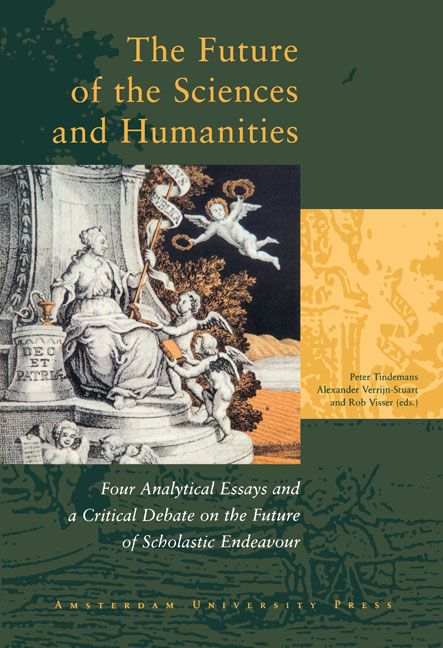 The Future of the Sciences and Humanities
The Future of the Sciences and Humanities Book contents
- Frontmatter
- Preface
- Contents
- 1 The Sciences and Arts Debate A review and some conclusions
- 2 Historical and Structural Approaches in the Natural and Human Sciences .
- The Role of Laws and Contingency in History
- 3 Science and Society in Flux
- Does A New Kind of Science Require a New Kind of Scholar or a New Kind of University?
- 4 Science for the 21st Century
- Redrawing Disciplinar Boundaries – but to What Degree?
- 5 Science and Democracy
- Science and Democracy: a Difficult Relationship: ‘An enlightened and elitist essay on an unresolvable problem’
- 6 Epilogue
- 7 Appendix
Does A New Kind of Science Require a New Kind of Scholar or a New Kind of University?
Published online by Cambridge University Press: 03 February 2021
- Frontmatter
- Preface
- Contents
- 1 The Sciences and Arts Debate A review and some conclusions
- 2 Historical and Structural Approaches in the Natural and Human Sciences .
- The Role of Laws and Contingency in History
- 3 Science and Society in Flux
- Does A New Kind of Science Require a New Kind of Scholar or a New Kind of University?
- 4 Science for the 21st Century
- Redrawing Disciplinar Boundaries – but to What Degree?
- 5 Science and Democracy
- Science and Democracy: a Difficult Relationship: ‘An enlightened and elitist essay on an unresolvable problem’
- 6 Epilogue
- 7 Appendix
Summary
Professor van Benthem suggests that the scientific study of cognition and information flow lies outside any of the existing sciences, or indeed any of the generally recognized academic disciplines. This has certainly been my experience after my own research interests moved into that area (from mainstream mathematical logic) in the mid-1980s. Since making that shift, I have not held a regular faculty position at any college or university. My interests simply did not fully accord with my discipline of training, namely mathematics.
For the period 1987-89, I had a research appointment at CSLI, the interdisciplinary research center at Stanford that I now direct. I then took a position as a mathematics department chair at a leading US liberal arts college – a wonderful type of interdisciplinary educational institution not found in Europe. Next, I tried my hand as a dean. And now I find myself back at CSLI, this time as its Executive Director. Throughout this 14-year period, I have regularly taught some mathematics courses and written various books on mathematical topics, but my main scholastic interests have been elsewhere, occupying a hitherto unnamed and almost unacknowledged nether-region having connections to mathematics, logic, computer science, linguistics, philosophy, psychology, sociology, communications, cognitive science, management science, and engineering, and which in the near future will, I believe, involve biology as well. In other words, I have been living for some time now in the scientific world Professor van Benthem describes.
The fact that I have been able to do this for so long indicates that the existing university framework does at least allow some individuals to pursue the kind of scholastic agenda he outlines – at least, for a limited number of such scholars. Of course, the approach I have followed only works for senior academics, already well established in their original disciplines, who can barter experience and administrative skills in exchange for the freedom to pursue such a risky research agenda. On the other hand, the area we are focussing on is not sufficiently well developed to offer a career path for younger scholars; there simply is not yet enough scholarly depth, nor the scholarly metrics and associated publication outlets, for a young scientist to establish her-or himself as an “information and cognition scientist.”
- Type
- Chapter
- Information
- The Future of the Sciences and HumanitiesFour Analytical Essays and a Critical Debate on the Future of Scholastic Endeavor, pp. 91 - 98Publisher: Amsterdam University PressPrint publication year: 2002


